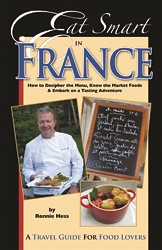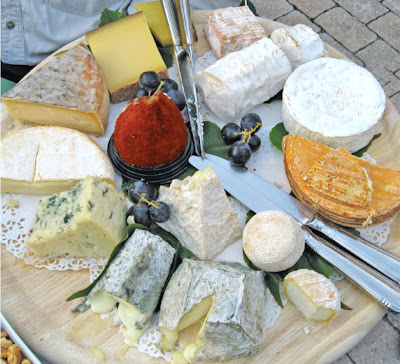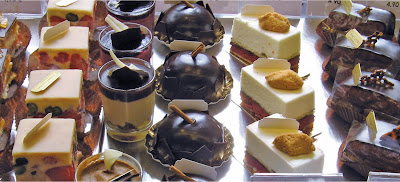Book Review and Author Interview: Eat Smart in France
Are you an intelligent traveler - one that wants to learn deeply about a culture before, during, and after you visit? Do you love to dig in to the food, traditions, textiles, music, books? I've discovered the book series for you. Eat Smart books give a great introduction to the inner workings of a culture, based on food and traditions. We've shared Eat Smart Sicily, by author and Eat Smart Publisher Joan Peterson, here on Wandering Educators. In fact, I just love the whole Eat Smart series (10 books, now!) - they truly are travel guides for food lovers.
The latest book in the Eat Smart series is one that just calls to me - Eat Smart in France: How to decipher the menu, know the market foods, and embark on a tasting adventure. Filled with recipes (!), gorgeous photos, the history of French cuisine, tips for shopping, resources for finding ingredients, helpful phrases, a menu guide, food and flavor guide, and (the best part, as all academics know), a reference guide to the food establishments. The contents of this book are a treasure - cleanly written, with experience and enthusiasm as only one who loves France and French food can share. And who better to share their love of French food, than author Ronnie Hess? She's an award-winning journalist who has lived and worked in France. Even better, she's the real deal - she has been a restaurant critic, food writer, and has an extensive background in both academia and Public Radio. She's also the author of a chapbook of poems, "Whole Cloth: A Poem Cycle," published by Little Eagle Press.

After reading Eat Smart in France, I kept it close for reference - in my purse, and then in my hands during the football game, at the dinner table, and then while on the phone...well, you know how it is when a book becomes both beloved and irreplaceable. This one of of THOSE books. We've started planning a trip to France, based on this book - and are learning about geography, culture, traditions, and, of course, food.. It's that much fun.

We sat down and talked with Ronnie about the book, her background in France, French culture and food, and even a recipe...
WE: Please tell us about your book, Eat Smart in France...
RH: Well, it’s a culinary travel guide. By that I mean it’s not a cookbook, although you can use it as such; and it’s also not a guidebook, telling you what to see or where to eat. It’s actually unusual, I think, because of what it combines in a small and inexpensive format. (And it still has beautiful color pictures!) It’s a book that gives you a lot of information – whether you are traveling to France or are an armchair tourist – to understand French food/culture. Like other books in the Eat Smart series, the book offers readers a short course on French culinary history; explains how the French eat; and identifies regional variations. The book also helps people translate French menus and food terms so you know what to order in a restaurant. Finally, there are resource chapters for people traveling to France, or looking for French food items to cook with. I hope the book conveys the idea that French food isn’t mannered or intimidating but down-to-earth and delicious.

WE: What is your background in France?
RH: I started traveling to France when I was about 15 years old. I had a French friend from grade school – we were students at a French private school in New York – who had returned to France. We had a terrific time – and I had a whirlwind tour of Paris. Since I was bilingual and my mother’s family was English, I traveled to Europe frequently as a teenager and young adult. But it was in the mid-1980s, when I was posted to France as a CBS News reporter, that I got to know the country in a much deeper way. And then again when I taught English to middle school students for a year in Burgundy several years ago. I love France and return there often.
WE: What led you to write this book?
RH: Ginkgo Press asked me to do it and I couldn’t refuse!
WE: How can travelers best prepare for a trip to France?
RH: Of course, they can read my book! But more generally, I think it’s always important to have an understanding of the culture and to be able to say a few words in the language. Even though many French people speak English, a little can go a long way in fostering mutual understanding and respect.

WE: How have French culture and food influenced each other?
RH: That’s a complicated subject. Food is an important aspect of culture – it can mirror a country’s (or a region’s) history, economy, geography and climate. I don’t see how you can separate the two. If you live by the sea, seafood will most likely become part of the diet, the region’s festivals and traditions. I remember meeting an American many years ago in Paris who was selling chocolate chip cookies from a sidewalk stand. No one knew what cookies were and didn’t like the idea of eating food on the run. That’s still true, but with globalization and a more urban culture, cookies are now quite popular.
WE: The recipes in this book are fantastic - how was it, doing research for this book? What are your favorites?
RH: Oh dear, that’s like asking which child do you love best. The recipes are original – people gave them to me and in most cases showed me exactly how to prepare the dish. Back home, I tested them several times, trying to make sure they worked with American ingredients and equipment.
Teurgoule
Rice pudding. Serves 8.
This recipe was inspired by Lionel Varin, a pâtissier and pastry teacher, now retired, and his wife, Marie-France, of Hauville, near Rouen; and by the Confrérie des Gastronomes de la Teurgoule et de la Fallue de Normandie, an organization that celebrates teurgoule and another traditional regional dish, la fallue, by regularly sponsoring a cooking contest. Teurgoule, a very thick rice pudding, and fallue, a dry cake, are often served together at the end of a celebration, such as a wedding. There are many variations of teurgoule, but the Varins are purists. They insist that only the basic ingredients should be included—no eggs, butter, flavorings (such as vanilla extract) or raisins.
8 cups (half a gallon) of whole or 2% milk
¾ cup round or Arborio-style rice
1 cup firmly packed brown sugar
2 teaspoons cinnamon
pinch of salt
Preheat oven to 350ºF. Wash the rice, then blanch it in a small saucepan for 4 minutes in rapidly boiling water to cover. Remove the rice from the heat and strain. Place the rice in a 4-quart, oven-safe mixing bowl, along with the sugar, salt and cinnamon. Stir in the milk. Bake the teurgoule for 30 minutes at 350ºF, reduce the oven temperature to 300ºF, and bake for 5 hours. The teurgoule will develop a brownish crust (from the sugar and cinnamon) and seem slightly runny, but the milk and rice will harden as it cools. Serve at room temperature.
© Ronnie Hess. Printed with permission.

Photo wikimedia commons: Raphael Labbé
WE: What things are surprising to you, while eating in France?
RH: I’d have to say foreign influences. I asked a French chef recently what his favorite meal was and he replied couscous, a typically North African dish. But it makes sense if you think about it – couscous is actually a pot-au-feu and fits right in with traditional French cooking.
WE: Is there anything else you'd like to share with us?
RH: We have a tendency to exaggerate our differences with the French. I wish we could get beyond this. Most French people have great respect for us and for our culture.
WE: Thanks so very much, Ronnie - I highly recommend your book to our Wandering Educators - it's useful, inspiring, and shows your great love of France.
For more information, please see:
http://www.eatsmartguides.com/
Cover design: Susan Chwae
Photography: Ronnie Hess
All photos courtesy and copyright Ronnie Hess and Eat Smart Guides
Note: We received a review copy of Eat Smart in France, from Gingko Press. Thank you!
-

- Log in to post comments



















